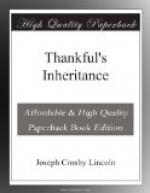“I declare,” she said, as she and Thankful sat together in the living-room that evening, “I don’t know’s I’ve done right, after all. I don’t know’s I wish I had stayed right where I was.”
“Mercy on us! Why?” demanded Thankful, a trifle impatiently.
“Oh, I don’t know. Maybe ’cause I’m kind of tired and nervous tonight. I feel as if—as if something was going to happen to me. I wonder if I could have another cup of tea before I went to bed; it might settle my nerves, you know.”
Considering that the lady had drunk three cups of tea at supper Mrs. Barnes could not help feeling doubtful concerning the soothing effect of a fourth. But she prepared it and brought it into the living-room. Miss Timpson sipped the tea and groaned.
“Do you ever have presentiments, Mrs. Barnes?” she asked.
“Have what?”
“Presentiments? Warnings, you know? I’ve had several in my life and they have always come to something. I feel as if I was going to have one now. Heavens! Hear that wind and rain! Don’t they sound like somebody calling—calling?”
“No, they don’t. They sound cold and wet, that’s all. Dear me, I never saw such a spell of weather. I thought this mornin’ ‘twas goin’ to clear, but now it’s come on again, hard as ever.”
“Well,” with dismal resignation, “we’ll all go when our time comes, I suppose. We’re here today and gone tomorrow. I don’t suppose there’s any use setting and worrying. Be prepared, that’s the main thing. Have you bought a cemetery lot, Mrs. Barnes? You ought to; everybody had. We can’t tell when we’re liable to need a grave.”
“Goodness gracious sakes! Don’t talk about cemetery lots and graves. You give me the blue creeps. Go to bed and rest up. You’re tired, and no wonder; you’ve moved no less’n three times since mornin’, and they say one movin’s as bad as a fire. Here! Give me that tea-cup. There’s nothin’ left in it but grounds, and you don’t want to drink them.”
Miss Timpson relinquished the cup, took her lamp and climbed the stairs. Her good night was as mournful as a funeral march. Thankful, left alone, tried to read for a time, but the wailing wind and squeaking shutters made her nervous and depressed, so, after putting the key under the mat of the side door for Heman Daniels, who was out attending a meeting of the Masonic Lodge, she, too, retired.
It was not raining when she awoke, but the morning was gray and cloudy. She came downstairs early, so early—for it was Sunday morning, when all East Wellmouth lies abed—that she expected to find no one, not even Imogene, astir. But, to her great surprise, Miss Timpson was seated by the living-room stove.
“Land sakes!” exclaimed Thankful. “Are you up? What’s the matter?”
Miss Timpson, who had started violently when Mrs. Barnes entered, turned toward the latter a face as white, so Thankful described it afterward, “as unbleached muslin.” This was not a bad simile, for Miss Timpson’s complexion was, owing to her excessive tea-drinking, a decided yellow. Just now it was a very pale yellow.




